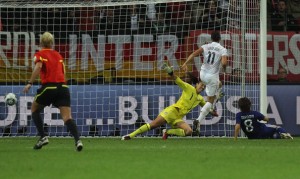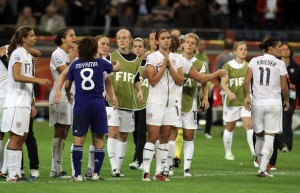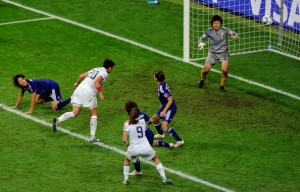Even in Defeat, U.S. Women’s Soccer Players Serve as Important Role Models

The Women's Soccer World Cup final was an exciting game that made fans forget about gender, at least for the day.
Had the United States Women’s Soccer Team held on to their second half and extra period leads in the 2011 Women’s World Cup there would probably have been dozens of articles written today about how the victory would change the culture for women’s sports and soccer in the United States. Because America is a country where most people generally give their loyalty to winners, most of those same writers are likely now writing about how women’s sports in general and specifically soccer can go back to their place on the back shelf of American sports interest.
I have been a fan of soccer since watching Pele and the New York Cosmos and then playing the sport as a youngster on some of the first youth soccer teams in my area in the late 1970s. However, even if the American women had won, one tournament wasn’t going to change the fact that soccer is a sport that Americans care about much like they do the primary Olympic sports. When national pride is on the line we care, but the rest of the time we don’t really care and never will.
I’m willing to bet if you walked the streets of just about any city or town in America and asked 50 people to name even one team from the MLS, most would look at you funny and ask “what is an MLS?” If you dared ask them about the WPS they would probably report you to the cops.
But while the result of the Women’s World Cup final may not have changed that fact, just the interest given to the game by the mainstream media does have an impact in another important way.
My seven-year-old daughter likes art, music and reading. There is absolutely no chance that she will be a professional athlete and though sports are on the television at our house almost continuously, she rarely has even the slightest interest.
However, twice in the last few months I have seen a spark in her eye about commercials for sporting events. The first was in early April when the NCAA Division I Women’s Basketball Final Four was being promoted. The second was this week in preparation for the Women’s World Cup final.
She sat and watched much of the women’s basketball Final Four with me and today though we were out and about during most of the game she navigated to the television when possible to see how the game was going and was genuinely interested when I would give reports while following the game on my phone.
I asked her this afternoon why she was interested in those games and she said it was because it isn’t that often that women’s sports are on television and she likes watching them.
Now we know that given all the sports channels around the country and need for programming on many of them there are probably far more women’s sports available to watch on television today than at any other time in history, but her point is actually a good one. It isn’t very often that women’s sports are given the same level of fanfare and attention that men’s sports receive on a regular basis.
Typically, for a women’s athletic event to gain top tier national attention and be worthy of highlights on Sports Center it has to be a championship event or have some special national significance.
ESPN will regularly show highlights from a Major League Baseball game between the Royals and Mariners, but I’m not sure I need even one hand to count the number of WNBA or WPS highlights I have seen on the “mother ship” this year.
Sure many will argue that ESPN is just covering the sports people really care about, but I’m not convinced that is always true. Attendance at WPS or WNBA games aren’t all that worse than crowds at Florida Marlin games, yet the Marlins get significantly more attention.
I’m not looking to jump specifically on ESPN because they probably give women’s sports more national exposure than anyone, but the reality is that as a culture and as sports fans, our fall-back position is to pay attention to men’s sports whether we really care about that particular game or not, but for us to care about a women’s sporting event it has to be special.
I believe one reason for that is the common perception that women’s sports are inferior in quality of performance than men’s sports. While female athletes may not be on the same level of athleticism as their male counterparts, the reality is that women’s sports are far from inferior in overall quality of performance and intensity.
Top female college and professional athletes of the 21st Century are skilled performers who have spent just as long perfecting their talents as their male counterparts. In fact, given that they have a few more limitations in athleticism, female athletes today are often much better at the basic skills of their sport and often put forth a level of effort that is equal or superior to their male counterparts.
What women’s sports often lack is national exposure and a stage to showcase that ability. Events like the Women’s World Cup are important because they give the top female athletes in the world a huge stage on which to perform and prove that their games are entertaining and exciting.
During the Women’s World Cup semifinals on Wednesday afternoon, we were eating lunch in a restaurant in downtown Greenville, SC, far away from any women’s sports or soccer hotbed. Yet when Abby Wambach scored the second U.S. goal there was a cheer throughout the restaurant.
I didn’t have to be watching the TV to know that the U.S. had scored. That kind of reaction can be found in bars and restaurants across this country every weekend during football season, but it isn’t normal for a women’s soccer game on a Wednesday afternoon.

Even in defeat the U.S. Women's World Cup team members are important role models for young girls in America.
When women’s athletic games are shown on television and publicized in the media it sends a signal to millions of sports fans that these sports aren’t just niche sports, but an important part of the overall sports landscape and something they should pay attention to.
Initiatives like Title IX provided access to athletic activities for girls, but it is the next step that events like the Women’s World Cup provides. They signal to young girls like my daughter that playing sports isn’t something just for boys or girls that in my era were known as “Tom Boys.” Instead, there are opportunities for any girl with an interest to participate and maybe one day they too can be playing on a grand stage.
Considering that most of the female role models available for young girls are either imaginary princesses or young teen stars whose wholesome television images are often a far cry from their real-life antics, these female athletes serve as a much-needed different option.
While there certainly will be disappointment that the American women didn’t come home with the championship, I hope all who watched and enjoyed their exciting ride will look past the final result and remember that women’s sports can be entertaining and a lot of fun to watch.

You must participate in a contest for top-of-the-line blogs on the web. I will suggest this website!
Have you any solutions for taking donates? I`d like to give a dollar
Excellent website. Plenty of helpful info here. I am sending it to several friends ans also sharing in delicious. And of course, thanks in your sweat!
Powaga. Nader odjazdowy serwis. Polecam wlasna witrynę internetową www. Wybitnie jest rzucajaca na kolana i bezspornie Tobie się zakreci. Dorzuć w ową stronę własną witrynę internetową www.
Hi this is somewhat of off topic but I was wanting to know if blogs use WYSIWYG editors or if you have to
manually code with HTML. I’m starting a blog soon but have no coding experience so I wanted to get guidance from someone with experience. Any help would be greatly appreciated!